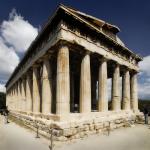|
This section contains 700 words (approx. 3 pages at 300 words per page) |

|
Fertile Lands. As did other places in the ancient world, Corinth had agriculture as its fundamental economic activity, especially in the Archaic Period (700- 480 B.C.E.). Corinth's territory was smaller than that of Athen's. Its agricultural land was therefore limited; moreover, it was divided into many small farms, which probably for that reason were less productive. On the other hand, the Corinthian land was more fertile than the land of Attica.
Crossroads. From an early time the commercial element in Corinth was stronger than elsewhere in Greece. This situation was only natural, given the city's location at the crossroads of land and sea routes. The historian Thucydides wrote that "Corinth was an emporium from most ancient times. At first it collected tolls from trade moving by land from and into the Peloponnese, then from trade by sea. The Corinthians built...
|
This section contains 700 words (approx. 3 pages at 300 words per page) |

|




